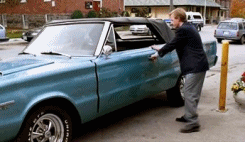Part-1: Preparing Your Automobile
1. Inspect the car. Is it truly "junky"? A junked automobile is one that is so badly damaged and beyond repair that selling it for parts makes the most sense. Is the car driveable or utterly immobile? Make a note of any areas that have sustained significant damage. Determine whether your automobile contains any valuable components, such as a GPS system, good-condition tires, or an alternator.
Take notes on everything you see and observe so that you can provide an accurate description of the car you're selling to junkyards.
2 Consult the Kelley Blue Book to ascertain the fair market value of your vehicle in good condition. The Kelley Blue Book is a well-known and commonly used reference for determining the value of a vehicle. Of course, the real amount of money you'll receive for your car will be significantly less than the Blue Book value, as you've plainly designated it as "junk" rather than in good shape. This is merely a guide to the price of a pristine version of the same make and model car.
If you are knowledgeable about automobile repair, you can subtract the Kelley Blue Book price from all prospective repair costs to get an indication of how much money you should expect when selling it.
3 Locate the vehicle's title. You will require your title to establish ownership of the vehicle. Most junkyards will not purchase your vehicle unless you can demonstrate that it is legally yours to sell. When you deliver it to the junkyard, you will need to sign over the title to them in order for them to take it off your hands officially. If you do not sign over the title to the car, you will technically retain ownership even if you have had no involvement with it.
4. Remove any personal belongings. It's all too easy to overlook an out-of-date iPod in the glovebox or a notebook packed into the seat pocket. Open the trunk, inspect beneath the floor mats, then put your hands beneath all of the seats. Ensure that you have removed all personal items from the vehicle before selling it. [6] This applies to your license plates as well. These are readily overlooked, but it is critical to remove them from your car prior to selling it.
5 Verify your state's standards for junked vehicles. As is the case with all other car-related concerns, each state's DMV conducts the procedure of trash car disposal differently. When you're ready to dispose of your junk car, be sure to research the state's rules. You might begin by conducting a Google search for "Salvaged Vehicle Regulations" and the name of your state.
Part-2: Considering Offers
1 Contact various salvage yards and junkyards in your neighborhood. You should not proceed until you have evaluated the specifics of the vehicle you are selling. You must thoroughly describe the vehicle in order for them to provide you with an exact price on how much they will pay you for it. [8] Maintain a running track of the various quotes you receive from various junkyards so that you may compare your possibilities.
2 Inquire about the junkyard's procedure for accepting junk cars. Certain junkyards will deconstruct the vehicles for you. Others will compensate you more if you perform the task yourself and save them time. Inquire as to whether they will pay more if you are able to drive the automobile to their lot versus having a tow truck come pick it up. Inquire precisely what documentation they will require from you. Ascertain that you are familiar with the ins and outs of each junkyard.
3 Evaluate the advantages and disadvantages of your alternatives. If you're not in a hurry to recoup every money from your car, you can pick for the most convenient choice. A junkyard across town may offer you a greater price if you drive it all the way there, but you may accept a lower offer if they agree to tow your faulty junk car. If you lack hands-on expertise working with cars, it's usually not a good idea to attempt dismantling the car yourself for a few additional dollars. Consider which choice is the most advantageous for you while still providing you a respectable profit.
Part 3 : Transferring the Vehicle
1 If you are able and comfortable, drive or tow the car to the junkyard. Some junkyards will pay you more if you transport the car to them, saving them time and labor. Furthermore, junkyards will pay more for a car that can still be driven and was recently driven, thus driving it to the junkyard will increase the worth of your car.
2 Arrange for your car to be picked up by the junkyard. This is the most practical solution. They'll come to wherever you are, pick up your automobile, and pay you right away. If your car cannot be driven, this is your only option. After gathering quotes from various rubbish removal firms, you can select the best one.
Sometimes junkyards will quote you a price and then dramatically reduce it once the automobile has been loaded into the tow truck. This is why it is critical to know the value of your vehicle and stick to your guns.
Don't get into an argument with the junk car towers over a few dollars, but stand firm if they try to offer you something considerably lower than what you were previously informed.
3 Return the plates and cancel your registration. The exact procedure varies by state, but in most cases, you must return the license plates to the DMV in order to terminate your registration. This information should be available at the junkyard, so ask them what is expected of you when you hand over your vehicle. The Internet is also a great resource, and the DMV website for your state should provide the exact steps for canceling your registration and returning your plates.




















 sunrise
StableDiffusion
sunrise
StableDiffusion
 bonfire friends
StableDiffusion
bonfire friends
StableDiffusion
 sadness
StableDiffusion
sadness
StableDiffusion

 purple skies
StableDiffusion
purple skies
StableDiffusion

 true love
StableDiffusion
true love
StableDiffusion
 My Cheerleader
StableDiffusion
My Cheerleader
StableDiffusion
 womans transformation to happiness and love
StableDiffusion
womans transformation to happiness and love
StableDiffusion
 future life together of adventures
StableDiffusion
future life together of adventures
StableDiffusion





















